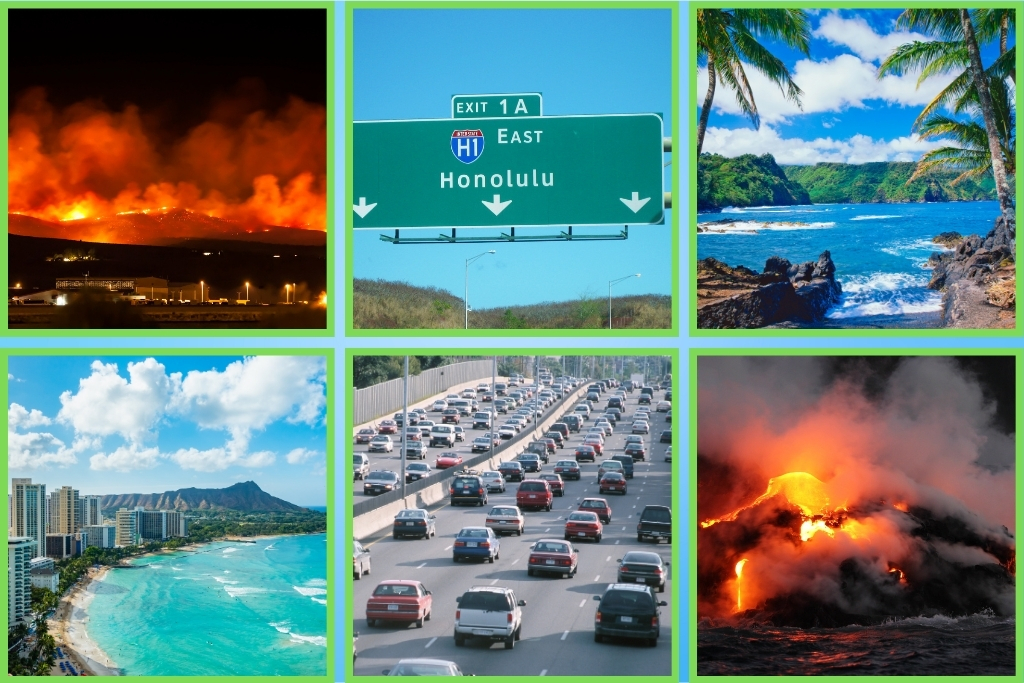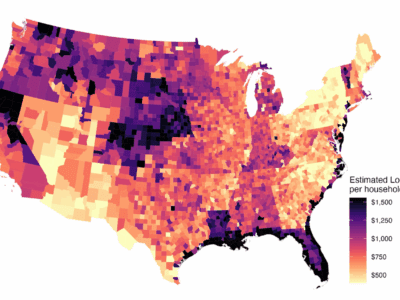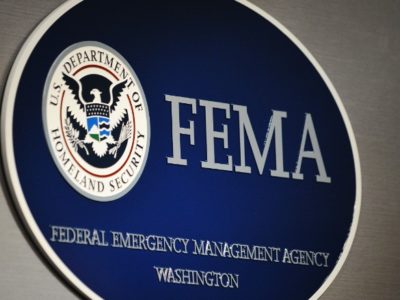The Hawai’i Youth Climate Trial
Thirteen youth plaintiffs say the Aloha State is failing to live up to its ambitious climate goals. Here’s what to watch for as Navahine v. Hawaiʻi Department of Transportation goes to trial this month.

Last summer, many Americans were glued to the events unfolding in Maui as a raging inferno overtook the town of Lahaina, trapping thousands and killing at least 99 people.
This summer, we’ll see 13 youth plaintiffs in Hawaiʻi take the state’s Department of Transportation to court for allegedly failing to implement climate policies meant to reduce greenhouse gas emissions—emissions that increase climate risks like last year’s Maui wildfires. Though the case was filed in June 2022, disasters fueled by extreme weather are a backdrop to the trial, which is set to get underway on June 24.
In short, the plaintiffs allege that state officials are failing to reduce the transportation system’s fossil fuel footprint, breaching their duty to conserve and protect the state’s natural resources. And they claim that failure is infringing on the young people’s constitutional right to a “clean and healthful environment.” Lawyers for the state have countered that Hawai‘i’ officials are taking steps to address climate change but that this lawsuit raises policy and political questions that should not be dealt with in the courts.
Last summer also featured the landmark climate trial won by 16 youth plaintiffs who sued Montana officials for that state’s climate-denying policies. In theory, these two cases are similar. Both are among a handful of active climate lawsuits against states brought by young people who have compelling stories about the impact on their lives. Their legal teams both include the public interest law firm Our Children’s Trust—the same firm that has brought many youth climate suits over the last decade. Both states are famous for their bucolic wilderness. Both states are seeing the dramatic effects of climate change. And both states promise a right to a clean and healthy environment.
However, there are new dynamics at play in the Aloha state that will be important to keep in mind as the June trial gets underway.
Hawaiʻi is a blue state and a climate leader
Democrats control all statewide offices, including Governor and Attorney General, and enjoy super majorities in both chambers of the state Legislature. That’s a longstanding trend: the Democratic Party has won all but three gubernatorial elections since 1959. So, Democratic leaders have forged the state’s climate policies.
Hawaiʻi has a statewide 2045 carbon neutrality target, one of the most ambitious in the nation. The legislature has also enacted a 2030 emissions reduction goal and a goal of decarbonizing the transportation sector. The state’s 2050 sustainability plan specifically underlines the importance of transitioning all state vehicles to zero emission by 2035. “Sustainability is not simply a goal; it is a commitment and a responsibility,” that plan reads.
The defense in this case agrees that “climate change is one of the most pressing environmental issues of our time,” as the motion to dismiss reads. “Hawai‘i has worked to become a leader among U.S. states in seeking to mitigate it through reduction of greenhouse gas emissions.”
The constitutional language
While many states have strong environmental protections, only three states have passed what is technically considered a “green amendment”: Pennsylvania, Montana, and New York. The nonprofit For the Generations defines a green amendment here. In Montana, for instance, the constitution’s Declaration of Rights guarantees a “a clean and healthful environment” as an inalienable right.
As we’ve discussed, the Hawaiʻi constitution does protect environmental rights, but not as part of the state Bill of Rights. Found instead in Article 11.9 of the constitution, it reads: “Each person has the right to a clean and healthful environment, as defined by laws relating to environmental quality, including control of pollution and conservation, protection and enhancement of natural resources. Any person may enforce this right against any party, public or private, through appropriate legal proceedings, subject to reasonable limitations and regulation as provided by law.”
Article 11.1 states: “For the benefit of present and future generations, the State and its political subdivisions shall conserve and protect Hawaii’s natural beauty and all natural resources, including land, water, air, minerals and energy sources, and shall promote the development and utilization of these resources in a manner consistent with their conservation and in furtherance of the self-sufficiency of the State.
Though not technically a green amendment, the combination of these constitutional articles provides the basis for the case.
The young people suing
The complaint alleges that the climate crisis is harming the property, health, and safety as well as cultural, recreational, aesthetic, and subsistence interests of the 13 plaintiffs and their communities.
For example, named plaintiff Navahine F. is a 16-year-old Native Hawaiian cultural practitioner whose ‘ohana (extended family and community network) has farmed for 10 generations. The complaint alleges that climate change is altering the growing season, decreasing crop yields, and threatening the health of the fishponds that they rely on for food. It also says that changing weather patterns and sea level rise are threatening critical infrastructure and burial sites crucial to the community.
Plaintiff Kaliko T. is a 13-year-old from Maui who lost her home to Tropical Storm Olivia in 2018. “Kaliko is also experiencing climate anxiety, which began at a young age when she would ask her mother if the world would still be here when she grew up,” the complaint says. In an interview last year, she said she joined the case “so nobody would have to experience what I have experienced, and so I can make the world a better place.”
The plaintiffs are represented by attorneys at Earthjustice as well as Our Children’s Trust.
Plaintiffs are seeking action
The plaintiffs are seeking injunctive relief as well as declaratory relief.
They’re asking the court to declare that state officials have breached their duties “to preserve, protect, and maintain public trust resources for present and future generations” by essentially not acting fast enough to transition the state’s infrastructure away from fossil fuels. They also request a declaratory order that makes clear their constitutional right to a clean and healthful environment has been violated. This is in line with the declaratory relief sought by the Montana youth plaintiffs at trial last summer.
But on top of this, the Hawaiʻi plaintiffs ask the court to force the state “to take concrete action steps under prescribed deadlines to conform the state transportation system with Defendants’ constitutional duties and Youth Plaintiffs’ constitutional rights.” They also want a special master appointed to oversee the state’s compliance with these deadlines.
The state’s response
In the motion to dismiss, attorneys for the state argued that responsibility for the planet-warming emissions at issue lies with fossil fuel companies, not the Department of Transportation. “Because Hawai‘i agencies are only able to control a small portion of the globe’s greenhouse gas emissions, they cannot realistically control climate change’s local impacts, like sea level rise and shoreline erosion,” the motion reads.
They also argue that climate policy is a political question for the legislature and the governor—not the courts. “Plaintiffs raise a policy dispute, which they must pursue through state legislative and executive processes,” the complaint states. (More on why that argument is remarkable below.)
However, the motion to dismiss was denied, with the judge finding that “the courts unequivocally have an important and long-recognized role in interpreting and defending constitutional guarantees.” Of course, we’ll have to wait and see what arguments the defense uses at trial.
The judge overseeing the case
Judge Jeffrey P. Crabtree is a Senior Environmental Court for the First Circuit, a position he’s held since 2017.
Before that assignment, he presided over felony trials and domestic violence trials, according to a court bio. He grew up in Hawai‘i, attended Williams College and the University of San Francisco, and received his J.D. from New York University School of Law. He practiced in Boston and New York City before returning to Hawaiʻi and practicing civil litigation for 30 years.
In this case, Crabtree denied the motion to dismiss in April 2023, setting the scene for trial. “Plaintiffs allege nothing less than that they stand to inherit a world with severe climate change and the resulting damage to our natural resources,” Judge Crabtree wrote then. “Destruction of the environment is a concrete interest. Since Defendants essentially argue Hawai‘i law does not require them to take action now, it appears a declaratory judgment action will help resolve the parties’ different views of what the Legislature and the Constitution require.” He rejected the state’s arguments that injunctive relief would not be appropriate, calling those arguments premature.
This is not the only high-profile climate lawsuit that Crabtree has been involved in as a judge. He’s overseeing a closely watched climate liability suit brought by the City and County of Honolulu against Big Oil. In March 2022, he dismissed attempts by oil companies such as Chevron, Shell and Exxon to toss the case.
The other big Hawai’i lawsuit
While these youth plaintiffs sue the state, Honolulu is suing Big Oil. The case, City & County of Honolulu v Sunoco LP, seeks to hold fossil fuel companies liable under Hawai‘i tort law for allegedly concealing and misrepresenting the climate-change impacts of their products for years. The defendants failed to move the case to federal court and the Hawai‘i Supreme Court let the case move to trial. The defendants have now, however, filed a petition for writ of certiorari at the U.S. Supreme Court. The oil industry wants the Supreme Court justices to weigh in on whether federal law prevents cities and counties from taking oil companies to trial. Honolulu is urging the Supreme Court to stay out of the dispute. The justices appear to be strongly considering taking up the case, but we won’t know until the fall.
Big Oil’s refrain in cases like Sunoco is that climate change doesn’t belong in court. “Climate policy is for Congress to debate and decide, not the court system,” the American Petroleum Institute has said in response to lawsuits by California other municipalities. If that sounds familiar, it’s because it’s eerily close to the argument by Hawaiʻi in its own defense in this youth climate case. “If Plaintiffs’ policy goals are to prevail, they must prevail in the halls of the legislature, not the halls of justice,” lawyers for Hawaiʻi argued in the motion to dismiss.
It will be fascinating to watch whether attorneys for the state continue to use this Big Oil argument that climate questions don’t belong in court. Could it, for example, later hamstring the city and county of Honolulu’s own argument in its case against Big Oil?
The youth climate movement at a crossroads
Youth climate activists won big in Montana last summer, but now that case is on appeal and there have been setbacks in other cases.
The lawsuit that kicked off the movement—a case called Juliana v. United States filed in Oregon federal court—appears to have to fizzled out without ever going to trial. A three-judge panel of the 9th U.S. Circuit Court of Appeals issued an order in early May dismissing the case. Our Children’s Trust may seek a review by the full 9th Circuit, but many observers like our Legal Planet colleague Richard Frank say this is basically the end of the road for the closely-watched litigation.
A more recent case suffered a similar fate barely a week later, when a federal judge in Los Angeles dismissed a lawsuit by 18 young people who claim the U.S. EPA discriminates against children by approving fossil fuel projects that release too many climate-warming pollutants. The judge in that case, called Genesis v. U.S. Environmental Protection Agency, found the plaintiffs lacked standing and Our Children’s Trust has since resubmitted an amended complaint.
The venue
The youth case is being heard at the Environmental Court, First Circuit in Honolulu. Hawaiʻi’s Environmental Courts were established in 2014 to have jurisdiction covering water, forests, streams, beaches, air, and mountains, along with terrestrial and marine life. Hawaii is only the second U.S. state to have a statewide environmental court. In 1990, Vermont founded the nation’s first statewide environmental court.
The trial is set to start on Monday, June 24 and is expected to last about two weeks. Unlike the Montana trial last summer, these proceedings could be eclipsed by some other major news events, from major opinions at the Supreme Court to the first presidential debate to the runup to the 2024 Summer Olympics in July. Not to mention the extreme weather we are seeing, including an above-normal hurricane season, flash flooding in Florida, and continued record-breaking heat. That is a fitting backdrop for the Hawaiʻi trial indeed.







Reader Comments